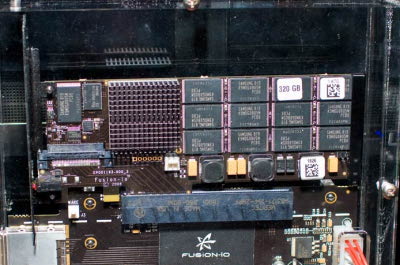- Qualcomm Launches Snapdragon 4 Gen 2 Mobile Platform
- AMD Launches Ryzen PRO 7000 Series Mobile & Desktop Platform
- Intel Launches Sleek Single-Slot Arc Pro A60 Workstation Graphics Card
- NVIDIA Announces Latest Ada Lovelace Additions: GeForce RTX 4060 Ti & RTX 4060
- Maxon Redshift With AMD Radeon GPU Rendering Support Now Available
Fusion-io’s PCI-E SSD to Put Current SSD’s to Shame
It’s no secret that SSDs are the new black. They’re incredibly fast, lightweight, have fantastic power consumption and have no moving parts. The only problem is that they are expensive, but prices are dropping like bricks from the sky, and it should only be another year before they become mainstream. But what if you are looking for even faster performance than what current products offer? Do you RAID a couple SSD’s together? That’s one option, but a company that goes by Fusion-io has another solution – a PCI-Express-based SSD.
You read that right. It’s an SSD that plugs straight into an available PCI-E slot and promises to take full advantage of the insane bandwidth there. What kind of numbers are we dealing with? While the fastest SSD’s on the market promise bandwidth of around 200MB/s Read, Fusion-io’s solution can deliver upwards of 500MB/s and top out at 700MB/s. Latency is also improved and results in about 50,000 IO’s per second.
The company was showing their goods at the E For All conference that happened over the weekend, and to prove to gamers just how useful their device is in gaming, they loaded up thirteen instances of World of Warcraft… in 36 seconds. They also promise streaming of 1,000 DVD’s at one time to be possible which means it can handle tons of requests without issue. The 80GB model is set to retail for under $1,000 at launch, so it’s definitely not going to be for everyone. It’s still great to see that such speeds are possible, though. All I know is… I want one, now.
 Credit: TG Daily |
The rep then copied the file to the Fusion-io drive. He also moved both the Photoshop and Windows swap files from the hard drive to the SSD. To make sure there wasn’t any funny business, the machine was rebooted to flush out any latent memory in system cache. This time the file took 28 seconds [750 megabyte file] to load, a full seven-fold improvement from before. With this drive, you could conceivably open, edit and save this document in the same time that it takes to for a hard drive-equipped computer to just open the file.




